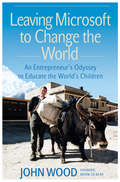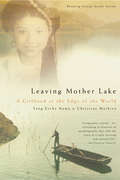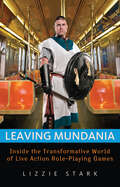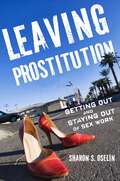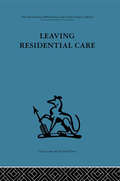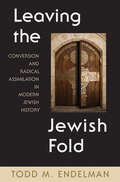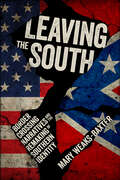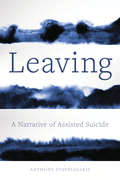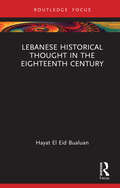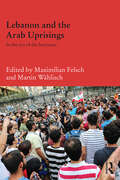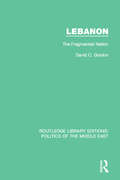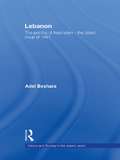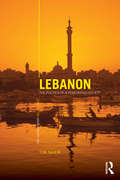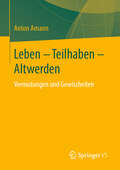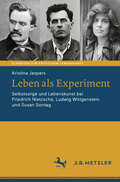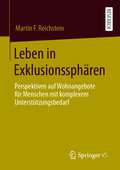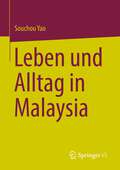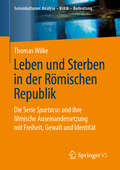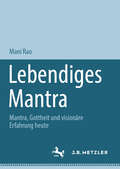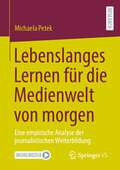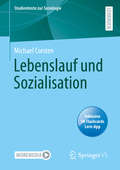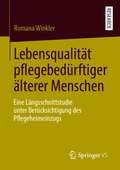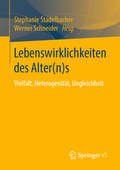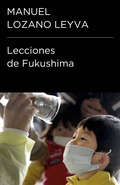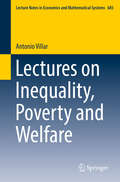- Table View
- List View
Leaving Microsoft to Change the World
by John WoodJohn Wood discovered his passion, his greatest success, and his life's work not at business school or helping lead Microsoft's charge into Asia in the 1990s but on a soul-searching trip to the Himalayas. He made the difficult decision to walk away from his lucrative career to create Room to Read, a nonprofit organization that promotes education across the developing world. By the end of 2007, the organization will have established over 5,000 libraries and 400 schools, and awarded long-term scholarships to more than 3,000 girls, giving more than one million children the lifelong gift of education. If you have ever pondered abandoning your desk job for an adventure and an opportunity to give back, Wood's story will inspire you. He offers a vivid, emotional, and absorbing tale of how to take the lessons learned at a hard-charging company like Microsoft and apply them to the world's most pressing social problems.
Leaving Mother Lake: A Girlhood at the Edge of the World
by Yang Erche Namu Christine MathieuLeaving Mother Lake is the extraordinary story of Yang Erche Namu - a girl growing up in the borderlands between Tibet and China, who left her remarkable childhood behind for the bright lights of Shanghai and singing stardom. Namu's home is in an area so primitive that during the Cultural Revolution the Red Guards arrived and left because there was nothing to destroy. When Namu was a small child, her mother tried to give her away three times because she would not stop crying. Each time she was returned. As she grew up, she clashed repeatedly with her equally fierce mother until the arrival of a Chinese official, looking for talented singers. Namu was selected for a singing competition in the nearest city - eight hours away - which, to her astonishment, she won. She realised she had a taste for the outside world and, despite her mother's protestations, she decided to run away Leaving Mother Lake is the lyrical story of the girl who grew out of her rural beginnings, battling against the odds to achieve extraordinary success.
Leaving Mundania: Inside the Transformative World of Live Action Role-Playing Games
by Lizzie StarkExposing a subculture only beginning to enter the imagination of mainstream America, this is the story of live action role-playing (LARP) games. A hybrid of games--such as Dungeons & Dragons, historical reenactment, fandom, and good old-fashioned pretend--LARP games are thriving and this book explores its multifaceted culture and related phenomenon, including the Society for Creative Anachronism, a medieval reenactment group that boasts more than 32,000 members. The history of LARP is detailed and is shown to have arisen from the pageantry of Tudor England and is currently being used as a training tool for the U.S. military. Along the way, the author duels foes with foam-padded weapons, lets the great elder god Cthulhu destroy her parents' beach house, and endures an existential awakening in the high-art LARP scene of Scandinavia.
Leaving Prostitution: Getting Out and Staying Out of Sex Work
by Sharon S. OselinWhile street prostitutes comprise only a small minority of sex workers, they have the highest rates of physicaland sexual abuse, arrest and incarceration, drug addiction, and stigmatization, which stem from both their public visibility and their dangerous work settings. Exiting the trade can be a daunting task for street prostitutes; despite this, many do try at some point to leave sex work behind. Focusing on four differentorganizations based in Chicago, Minneapolis, Los Angeles, and Hartford that help prostitutes get off the streets, Sharon S. Oselin’s Leaving Prostitution explores the difficulties, rewards, and public responses tofemale street prostitutes’ transition out of sex work.Through in-depth interviews and field research with street-level sex workers, Oselin illuminates their pathways into the trade and their experiences while in it, and the host of organizational, social, and individual factors that influence whether they are able to stop working as prostitutes altogether. She also speaks to staff atorganizations that aid street prostitutes, and assesses the techniques they use to help these women develop self-esteem, healthy relationships with family and community, and workplace skills. Oselin paints a full picture of the difficulties these women face in moving away from sex work and the approaches that do and do not work to help them transform their lives. Further, she offers recommendations to help improve the quality of life for these women. A powerful ethnographic account, Leaving Prostitution provides an essential understanding of getting out and staying out of sex work.
Leaving Residential Care (Residential Social Work Ser.)
by Gwyneth Roberts Paul Brearley Penny Gutridge Jim Black Elizabeth TarranTavistock Press was established as a co-operative venture between the Tavistock Institute and Routledge & Kegan Paul (RKP) in the 1950s to produce a series of major contributions across the social sciences. This volume is part of a 2001 reissue of a selection of those important works which have since gone out of print, or are difficult to locate. Published by Routledge, 112 volumes in total are being brought together under the name The International Behavioural and Social Sciences Library: Classics from the Tavistock Press. Reproduced here in facsimile, this volume was originally published in 1982 and is available individually. The collection is also available in a number of themed mini-sets of between 5 and 13 volumes, or as a complete collection.
Leaving the Jewish Fold
by Todd EndelmanBetween the French Revolution and World War II, hundreds of thousands of Jews left the Jewish fold--by becoming Christians or, in liberal states, by intermarrying. Telling the stories of both famous and obscure individuals, Leaving the Jewish Fold explores the nature of this drift and defection from Judaism in Europe and America from the eighteenth century to today. Arguing that religious conviction was rarely a motive for Jews who became Christians, Todd Endelman shows that those who severed their Jewish ties were driven above all by pragmatic concerns--especially the desire to escape the stigma of Jewishness and its social, occupational, and emotional burdens. Through a detailed and colorful narrative, Endelman considers the social settings, national contexts, and historical circumstances that encouraged Jews to abandon Judaism, and factors that worked to the opposite effect. Demonstrating that anti-Jewish prejudice weighed more heavily on the Jews of Germany and Austria than those living in France and other liberal states as early as the first half of the nineteenth century, he reexamines how Germany's political and social development deviated from other European states. Endelman also reveals that liberal societies such as Great Britain and the United States, which tolerated Jewish integration, promoted radical assimilation and the dissolution of Jewish ties as often as hostile, illiberal societies such as Germany and Poland. Bringing together extensive research across several languages, Leaving the Jewish Fold will be the essential work on conversion and assimilation in modern Jewish history for years to come.
Leaving the South: Border Crossing Narratives and the Remaking of Southern Identity
by Mary Weaks-BaxterMillions of Southerners left the South in the twentieth century in a mass migration that has, in many ways, rewoven the fabric of American society on cultural, political, and economic levels. Because the movements of Southerners—and people in general—are controlled not only by physical boundaries marked on a map but also by narratives that define movement, narrative is central in building and sustaining borders and in breaking them down. In Leaving the South: Border Crossing Narratives and the Remaking of Southern Identity, author Mary Weaks-Baxter analyzes narratives by and about those who left the South and how those narratives have remade what it means to be southern. Drawing from a broad range of narratives, including literature, newspaper articles, art, and music, Weaks-Baxter outlines how these displacement narratives challenged concepts of Southern nationhood and redefined Southern identity. Close attention is paid to how depictions of the South, particularly in the media and popular culture, prompted Southerners to leave the region and changed perceptions of Southerners to outsiders as well as how Southerners saw themselves. Through an examination of narrative, Weaks-Baxter reveals the profound effect gender, race, and class have on the nature of the migrant’s journey, the adjustment of the migrant, and the ultimate decision of the migrant either to stay put or return home, and she connects the history of border crossings to the issues being considered in today’s national landscape.
Leaving: A Narrative of Assisted Suicide
by Anthony StavrianakisThe first book length anthropological study of voluntary assisted dying in Switzerland, Leaving is a narrative account of five people who ended their lives with assistance. Stavrianakis places his observations of the judgment to end life in this way within a larger inquiry about how to approach and understand the practice of assisted suicide, which he characterizes as operating in a political, legal, and medical "parazone," adjacent to medical care and expertise. Frequently, observers too rapidly integrate assisted suicide into moral positions that reflect sociological and psychological commonplaces about individual choice and its social determinants. Leaving engages with core early twentieth-century psychoanalytic and sociological texts arguing for a contemporary approach to the phenomenon of voluntary death, seeking to learn from such conceptual repertoires, as well as to acknowledge their limits. Leaving concludes on the anthropological question of how to account for the ethics of assistance with suicide: to grasp the actuality and composition of the ethical work that goes on in the configuration of a subject, one who is making a judgment about dying, with other participants and observers, the anthropologist included.
Lebanese Historical Thought in the Eighteenth Century (Routledge Approaches to History #53)
by Hayat El BualuanThis study of Lebanese historical thought and its role in national identity formation in the eighteenth century focuses on a sample of historians, mainly Christians, who lived and wrote during the Shihabi Emirate from 1697 till the Egyptian invasion in 1831. These historians, who represent different trends in historical writing, were able to develop the idea of Lebanon as a unique entity and as a haven and to underline its specificity and distinctiveness. With a focus on primary sources, this book endeavors to penetrate into the main concerns and ways of thinking at this time when a Lebanese identity started to bloom. In doing so, it discovers a neglected century as a fruitful and rich period in the history of Lebanon and a prelude to nineteenth-century awakening. This book will be of interest to scholars of the history and historiography of Lebanon and the Middle East, with relevance for specialized courses in the fields of history and historiography at universities.
Lebanon and the Arab Uprisings: In the Eye of the Hurricane (Durham Modern Middle East and Islamic World Series)
by Maximilian Felsch Martin WählischThe Arab uprisings have put Lebanon under increased strain. While the revolutions in Tunisia and Egypt caused limited reverberations, the war in Syria echoed in the fine-tuned political and confessional balance of Lebanon. Over one million refugees, equal to one-quarter of Lebanon’s population, have moved in from Syria. The country’s economy and its already weak public infrastructure have been impacted heavily. Hizbullah’s engagement in Syria has posed questions about Lebanon’s disassociation policy. Terrorist attacks by ISIL and the growing risk of radicalization across the confessional spectrum have left the country at unease. However, Lebanon’s political elites have vowed to shield the country from regional turbulences. Lebanon recently saw a series of demonstrations because of the inability of the government to manage the garbage crisis, but it has been far from witnessing a large-scale citizen uprising similar to the 2005 Cedar Revolution or the revolts next door. This book provides a comprehensive overview of the current situation in Lebanon, and a detailed assessment of the difficulties which the country is currently facing.
Lebanon: The Fragmented Nation (Routledge Library Editions: Politics of the Middle East #18)
by David C. GordonEven up to the eve of the civil war, some observers saw the Lebanese system as essentially stable, and exhibiting some of the virtues of liberty and pluralism which had been commended by the French traveller de Volney a century before. But for others its structure was so seriously flawed as to be resolved only by revolution. The civil war resulted ultimately from a conglomeration of interdependent factors – the religious conflict of Christian and Shi’a Muslim, the social divisions exemplified in the ‘Belt of Misery’ around Beirut, and the ethnic frictions between the Arab host culture and the Occidentalised Maronites. This book, first published in 1980, is a lively and incisive study of one of the most ravaged countries of this generation.
Lebanon: The Politics of Frustration - The Failed Coup of 1961 (History and Society in the Islamic World)
by Adel BesharaLebanon examines the ideological, political and social underpinnings of the attempted coup against General Chihab's government in Lebanon in 1961. The author analyzes the role of the Syrian Socialist Nationalist Party, the history of the army in Lebanon and it role in Lebanese politics and the impact of the coup on Lebanese political life. This book provides an extraordinary insight into the mechanisms of military coups in the Arab world and will be of interest to students and researchers of the history and politics of the Middle East.
Lebanon: The Politics of a Penetrated Society (The Contemporary Middle East #Vol. 6)
by Tom NajemIn a time of great political change and unrest in the Middle East, this highly topical text offers a succinct account of the contemporary political environment in Lebanon. Tom Najem provides both a developed understanding of the pre-civil war system and an analysis of how circumstances resulting from the civil war combined with essential pre-war elements to define politics in Lebanon. Systematically exploring Lebanon’s history, society and politics, the author stresses the importance of the crucial role of external actors in the Lebanese system. The analysis encompasses: the formation of the state weaknesses and dynamics of the Lebanese state the civil war post-war government and change the Lebanese economy foreign policy. Written in a clear and accessible manner, this book fills a conspicuous gap in the existing academic literature on Lebanon. It will be of interest not only to students of international politics and Middle East studies, but also to anyone travelling in or wanting to learn more about the region.
Leben - Teilhaben - Altwerden: Vermutungen und Gewissheiten
by Anton AmannLeben muss als Ergebnis der Evolution aufgefasst werden und menschliches Leben als die Entstehung der Art Sapiens aus der Gattung des Homo aus der Familie der Menschenaffen. Wird die Entstehung menschlichen Lebens als evolutionäre Tatsache mit der Vorstellung sozialen Lebens gekoppelt, werden wir auf die konstruktive Hervorbringung der menschlichen Lebensformen verwiesen, deren integraler Bestandteil gesellschaflichte Teilhabe ist. Teilhabe ist einerseits an die Phylogenese der Art Sapiens rückgebunden, muss andererseits aber von jedem Menschen in der Ontogenese neu erworben und praktiziert werden, wobei er auf Umwelt angewiesen ist. Teilhabe im Alter ist eine eigene Spezifikation der Bedingungen dieses Prozesses und lässt sich anhand einer Vielzahl von empirischen Befunden darstellen.
Leben als Experiment: Selbstsorge und Lebenskunst bei Friedrich Nietzsche, Ludwig Wittgenstein und Susan Sontag (Schriften zur Kritischen Lebenskunst)
by Kristina JaspersFriedrich Nietzsche, Ludwig Wittgenstein und Susan Sontag beschäftigten sich intensiv mit Fragen der Selbstsorge und Lebenskunst – teils im direkten Bezug aufeinander. So sah Wittgenstein in Nietzsche ein Vorbild in Fragen der Stilistik und Introspektion; Sontag wollte Wittgenstein in der Konsequenz seiner Lebensentscheidungen folgen und Nietzsche in seinem Selbstbewusstsein sowie in seiner radikalen Selbstkritik. Diese Arbeit untersucht drei Experimentierfelder, auf denen Nietzsche, Wittgenstein und Sontag sich erprobt haben und macht diese für heute fruchtbar: Ortswechsel dienen der Veränderung des äußeren Umfelds, der Suche nach neuen Anregungen oder dem Rückzug in eine ihnen gemäße Umgebung. Die Beschäftigung mit Gesundheit und Krankheit betrifft ihre psychische wie physische Verfasstheit und schließt mentale Übungen ein. In der künstlerischen Praxis suchen alle drei neue Erfahrungen, ein anderes Selbsterleben sowie Ausdrucksmöglichkeiten jenseits der Sprache.
Leben in Exklusionssphären: Perspektiven auf Wohnangebote für Menschen mit komplexem Unterstützungsbedarf
by Martin F. ReichsteinIm Bereich wohnbezogener Hilfen für Menschen mit sogenannter geistiger Behinderung treten systemisch und systematisch ,Exklusionssphären‘ in Form von hochspezialisierten Angeboten sowie ,Resteinrichtungen‘ auf. Hiervon sind aktuell Menschen mit komplexen Unterstützungsbedarfen besonders betroffen. Der Autor untersucht am Beispiel von Menschen mit sogenannter geistiger Behinderung und herausforderndem Verhalten, schwerer bzw. mehrfacher Beeinträchtigung sowie fortgeschrittenem bzw. hohem Lebensalter explorativ das Entstehen von ,Exklusionssphären‘ sowie deren Auswirkungen auf die individuelle Lebensqualität und die persönlichen Sozialräume betroffener Personen.
Leben und Alltag in Malaysia
by Souchou YaoMalaysia ist eine wohlhabende, sich entwickelnde Nation in Südostasien. Seine Bürger sind mit den Problemen konfrontiert, die das Leben der Menschen überall auf der Welt kennzeichnen. Diese Probleme betreffen die Familie und die wirtschaftliche Sicherheit ebenso wie die existenziellen Entscheidungen, die wir gewöhnlich mit den Bewohnern entwickelter Gesellschaften verbinden. Mit der Kunst der Ethnographie und der kulturellen Analyse des Anthropologen zeigt das Buch, wie gewöhnliche Malaysier mit den Unwägbarkeiten und der Unbeständigkeit ihrer täglichen Existenz umgehen. In einer leicht postkolonialen Geste überträgt Doing Lifework in Malaysia das Werk von Heidegger, Arendt, Camus und Sartre - den Meistern des europäischen Existenzialismus - auf eine Situation, die erkennbar aus der "Dritten Welt" stammt. Das Ergebnis ist eine Reihe eindringlicher und erhellender Essays, die ein breites Spektrum sozialer Akteure abdecken, darunter eine tamilische Hausangestellte, die Filmemacherin Jasmin Ahmed, ein malaiischer Großhändler, der zum Ökologen wurde, eine Gruppe chinesischer Händler im Landesinneren von Sarawak und eine ehemalige kommunistische Aufständische. Diese faszinierende Studie beleuchtet das malaysische Gesellschaftsleben neu und rückt dabei Themen in den Mittelpunkt, die in anderen Berichten normalerweise nicht behandelt werden: Hinduistische Verehrung als Auflehnung gegen die Tradition, Gabentausch und Globalisierung, Rassenneid und Psychoanalyse, Kleinstkapitalismus und Einsamkeit.
Leben und Sterben in der Römischen Republik: Die Serie Spartacus und ihre filmische Auseinandersetzung mit Freiheit, Gewalt und Identität (Serienkulturen: Analyse – Kritik – Bedeutung)
by Thomas WilkeDer Band beschäftigt sich mit der amerikanischen Produktion "Spartacus" und der britisch-amerikanisch-italienischen Koproduktion Rom. In der Auseinandersetzung mit der Gegenwart lässt sich immer wieder eine Hinwendung zur griechischen oder römischen Antike beobachten. Dort die Wurzeln der westlichen Gesellschaft für Politik, Ökonomie oder Philosophie zu finden oder vergleichende Argumente für Expansionsbestrebungen oder Niedergang herzuleiten, das gehört nicht nur zu den rhetorischen Gemeinplätzen. So ist es auch nicht verwunderlich, dass auch das Format TV-Serie sich dieser Zeit annimmt. Während in Rom versucht wird, sich entlang der historischen Vorgaben detailgetreu abzuarbeiten, kann bei Spartacus bis auf die grobe Skizze des Handlungsrahmens von einer weitest gehenden Vernachlässigung der historischen Situation gesprochen werden. Aus einer (medien-)ethischen Perspektive heraus lassen sich in den Serien im Weiteren spezifische Betrachtungsweisen zu Verantwortung, Wertevermittlung, Loyalität, Erziehung, Selbstdisziplin, Religion ausmachen, die als Selbstaussagen der Gegenwart respektive der Produzenten gewertet werden können.
Lebendiges Mantra: Mantra, Gottheit und visionäre Erfahrung heute
by Mani RaoLiving Mantra ist eine Anthropologie der Mantra-Erfahrung unter hinduistisch-tantrischen Praktizierenden. In alten indischen Lehren und Legenden rufen Mantras, die von Rishis (Sehern) wahrgenommen werden, Gottheiten an und haben transformative Kräfte. Mit einer Methodik, die Wissenschaft und Praxis verbindet, entdeckt Mani Rao eine fortdauernde Tradition von Visionären (Rishis/Sehern) und Offenbarungen im südindischen Bundesstaat Andhra-Telangana. Das tiefgründig recherchierte und mit faszinierenden Erzählungen gespickte Buch formuliert die Poetik der Mantra-Praxis neu, während es gleichzeitig praktische Fragen erforscht. Kann man wissen, ob eine Vision real oder eingebildet ist? Ist eine Vision visuell? Werden Gottheitsvisionen durch die Kultur vermittelt? Wenn Mantras wirksam sind, welche Rolle spielt dann die Hingabe? Sind Mantras Sprache? Living Mantra stellt nicht nur theoretische Fragen, sondern auch solche, die sich ein Praktizierender stellen würde: Wie wählt man zumBeispiel eine Gottheit aus oder was bindet einen an einen Guru? Rao betritt Neuland, indem er die Aufmerksamkeit auf die Momente lenkt, die der Systematisierung und Kanonbildung vorausgehen, und zeigt, wie autoritative Quellen entstehen.
Lebenslanges Lernen für die Medienwelt von morgen: Eine empirische Analyse der journalistischen Weiterbildung
by Michaela PetekWarum „lebenslanges Lernen für die Medienwelt von morgen“ sowohl für Journalistinnen und Journalisten als auch für Medienunternehmen alternativlos ist, legt Michaela Petek hier in einer empirischen Analyse der journalistischen Weiterbildung dar. Im Vergleich zum seit fünf Jahrzehnten gut untersuchten Bereich der journalistischen Ausbildung wird damit erstmals in der Journalismusforschung die Weiterbildung umfassend unter die Lupe genommen. Michaela Peteks Ziel ist es, alle Akteure auf dem journalistischen Weiterbildungsmarkt in die Untersuchung mit einzubeziehen: Journalist*innen, Medienunternehmen und Weiterbildungsinstitutionen. Neben ökonomischen Zwängen sind es vor allem die technischen Innovationen, die den Wandel in der Medienlandschaft vorantreiben. So entstehen ständig neue Produkte und Formate, Redaktionsstrukturen, Arbeitsabläufe, Berufsbilder. In dieser sich rasant wandelnden Medienwelt ist die kontinuierliche Investition in Weiterbildung für Journalistinnen und Journalisten notwendig, um einem immer wieder neu an die Veränderungen anzupassenden journalistischen Kompetenzprofil gerecht zu werden.
Lebenslauf und Sozialisation (Studientexte zur Soziologie)
by Michael CorstenDieses Lehrbuch ist eine Einladung, sich aus soziologischer Perspektive mit den Themen des Lebenslaufs und der Sozialisation auseinanderzusetzen. Es zeigt die inhaltlichen und methodischen Bezüge zwischen Lebenslauf- und Sozialisationsforschung. Lebenslauf und Sozialisation werden untersucht, um die Einflüsse der Gesellschaft auf individuelle Entwicklungs- und Bildungsprozesse zu rekonstruieren. Diese erfahrungswissenschaftliche Perspektive auf Lebenslauf und Sozialisation begann im 20. Jahrhundert in den USA und etablierte sich als Forschungsrichtung in der Soziologie weltweit.Zusätzliche Fragen per App: Laden Sie die Springer Nature Flashcards-App kostenlos herunter und nutzen Sie exklusives Zusatzmaterial, um Ihr Wissen zu prüfen.
Lebensqualität pflegebedürftiger älterer Menschen: Eine Längsschnittstudie unter Berücksichtigung des Pflegeheimeinzugs
by Romana WinklerRomana Winkler untersucht den Einfluss des Pflegeheimeinzugs sowie ausgewählter Aspekte sozialer Ungleichheit auf die Lebensqualität pflege- und betreuungsbedürftiger älterer Menschen in Österreich. Dies erfolgt durch eine Längsschnittstudie beim Einzug in das Pflegeheim sowie eine und zwölf Wochen danach, und zwar durch eine Mehrebenenanalyse, die strukturelle Unterschiede zwischen Pflegeheimen mitberücksichtigt. Detailliert analysiert die Autorin Einflussfaktoren auf die Gesamt-Lebensqualität und Teilbereiche sowie Gründe für eine Verbesserung bzw. Verschlechterung. Sie liefert Anregungen für weitere Forschungsaktivitäten und konkrete Handlungsempfehlungen für die Praxis.
Lebenswirklichkeiten des Alter(n)s: Vielfalt, Heterogenität, Ungleichheit
by Werner Schneider Stephanie StadelbacherAlter(n) ist eine gesellschaftliche Konstruktion, die sich abhängig von soziokulturellen und sozialstrukturellen Rahmenbedingungen auf der einen Seite und lebensweltlichen Bezügen, Interaktions- und Beziehungssystemen auf der anderen Seite realisiert. Im Sammelband soll ein Blick in die verschiedenen Lebenswelten der Älterwerdenden und Alten im Sinne von gesellschaftlich gerahmten, sozial gestalteten und subjektiv wahrgenommenen Wirklichkeiten des Alter(n)s in unserer Gesellschaft geworfen werden. Als relevante lebensweltliche Bereiche werden hier Gesundheit, Arbeit (und Freizeit), Wohnen, Familie/soziale Beziehungen, Sozialraum, soziales Engagement bis hin zu Pflege und Lebensende betrachtet. In den Beiträgen sollen Gegenwartsanalysen und mögliche Zukunftsszenarien zum Älterwerden und Altsein in unserer Gesellschaft skizziert werden.
Lecciones de Fukushima (Colección Endebate #Volumen)
by Manuel Lozano LeyvaLas claves para comprender mejor el debate nuclear y qué sucedió realmente en Fukushima. La catástrofe de Fukushima se ha mostrado en los medios de comunicación como un infierno contemporáneo, comparándola desde el primer momento con la tragedia de Chernóbil y desatando una gran preocupación a escala mundial. Este gran alarmismo podría haberse evitado con información técnica asequible para los no especialistas en energía nuclear. Manuel Lozano Leyva nos explica de forma sencilla qué es la energía nuclear, cómo funcionan las centrales nucleares o qué efectos tiene la radioactividad; nos da las claves para entender las causas y consecuencias del accidente de Fukushima y reflexiona sobre lo que supone para la continuidad de la energía nuclear.
Lectures on Inequality, Poverty and Welfare
by Antonio VillarThese lectures aim to help readers understand the logics and nature of the main indicators of inequality and poverty, with special attention to their social welfare underpinnings. The key approach consists in linking inequality and poverty measurement with welfare evaluation. As concern for inequality and poverty stems from ethical considerations, the measurement of those aspects necessarily involves some value judgments. Those value judgments can be linked, directly or indirectly, to welfare assessments on the distribution of personal and social opportunities. Inequality and poverty are thus considered to be partial aspects of the welfare evaluation of the opportunities in a given society. The volume includes two applications that illustrate how the models can be implemented. They refer to inequality of opportunity and poverty in education, using PISA data.
